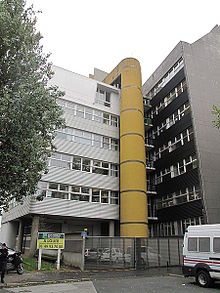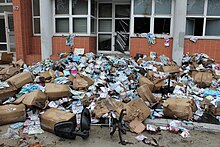This is an old revision of this page, as edited by Emigdioofmiami (talk | contribs) at 12:11, 7 January 2015. The present address (URL) is a permanent link to this revision, which may differ significantly from the current revision.
Revision as of 12:11, 7 January 2015 by Emigdioofmiami (talk | contribs)(diff) ← Previous revision | Latest revision (diff) | Newer revision → (diff)| This article documents a current event. Information may change rapidly as the event progresses, and initial news reports may be unreliable. The latest updates to this article may not reflect the most current information. Feel free to improve this article or discuss changes on the talk page, but please note that updates without valid and reliable references will be removed. (Learn how and when to remove this message) |
| 2015 Charlie Hebdo shooting | |
|---|---|
| Location | Paris, France |
| Date | January 7, 2015 |
| Target | Charlie Hebdo employees |
| Attack type | Spree shooting |
| Weapons | |
| Deaths | 11 |
| Injured | 10 |
| Perpetrator | muslim immigrants |
On 7 January 2015, at about 11 a.m., two or three masked men stormed the headquarters of the French satrical magazine Charlie Hebdo in Paris. Early reports suggested that eleven people were killed and ten injured. The assault happened late in the morning local time, when masked gunmen entered the building, and began shooting with automatic weapons - reports speak of up to 50 shots being fired.
Background
Charlie Hebdo (Template:IPA-fr; French for Charlie Weekly) is a French satirical weekly newspaper, featuring cartoons, reports, polemics and jokes. Irreverent and stridently non-conformist in tone, the publication is strongly antireligious and left-wing, publishing articles on the extreme right, Catholicism, Islam, Judaism, politics, culture, etc. According to its editor, Charb, the magazine's editorial viewpoint reflects "all components of left wing pluralism, and even abstainers".
It first appeared from 1969 to 1981; it folded, but was resurrected in 1992. As of 2012 the editor is Charb (Stephane Charbonnier). His predecessors are François Cavanna (1969–1981) and Philippe Val (1992–2009). The magazine is published every Wednesday, with special editions issued on an unscheduled basis.
2011 firebombing
The paper's controversial 3 November 2011 issue, renamed "Charia Hebdo" and "guest-edited" by Muhammad. He is depicted saying: "100 lashes of the whip if you don't die laughing."


In the early hours of November 2, 2011, the newspaper's office in the 20th arrondissement was fire-bombed and its website hacked. The attacks were presumed linked to its decision to rename a special edition "Charia Hebdo", with the Islamic Prophet Mohammed listed as the "editor-in-chief". The cover, featuring a cartoon of Mohammed by Luz (Renald Luzier), had circulated on social media for a couple of days.
Charb was quoted by AP stating that the attack might have been carried out by "stupid people who don't know what Islam is" and that they are "idiots who betray their own religion". Mohammed Moussaoui, head of the French Council of the Muslim Faith, said his organisation deplores "the very mocking tone of the paper toward Islam and its prophet but reaffirms with force its total opposition to all acts and all forms of violence." François Fillon, the prime minister, and Claude Guéant, the interior minister, voiced support for Charlie Hebdo, as did feminist writer Ayaan Hirsi Ali, who criticised calls for self-censorship.
2012 cartoons
In September 2012, the newspaper published a series of satirical cartoons of Mohammed, some of which feature nude caricatures of him. Given that this came days after a series of attacks on U.S. embassies in the Middle East, purportedly in response to the anti-Islamic film Innocence of Muslims, the French government decided to increase security at certain French embassies, as well as to close the French embassies, consulates, cultural centers, and international schools in about 20 Muslim countries. In addition, riot police surrounded the offices of the magazine to protect against possible attacks.
Foreign Minister Laurent Fabius criticised the magazine's decision, saying, "In France, there is a principle of freedom of expression, which should not be undermined. In the present context, given this absurd video that has been aired, strong emotions have been awakened in many Muslim countries. Is it really sensible or intelligent to pour oil on the fire?" However, the newspaper's editor defended publication of the cartoons, saying, "We do caricatures of everyone, and above all every week, and when we do it with the Prophet, it's called provocation."
2015 shooting
See also
References
- "En DIRECT Attaque à Charlie Hebdo : "C'est un attentat terroriste", dit François Hollande". lesechos.fr. 7 January 2015.
{{cite web}}: no-break space character in|title=at position 34 (help) - "Gun attack on French magazine Charlie Hebdo kills 11". BBC News. 7 January 2015. Retrieved 7 January 2015.
- "Charlie Hebdo attack – latest". BBC News. 7 January 2015. Retrieved 7 January 2015.
- Charb. "Non, "Charlie Hebdo" n'est pas raciste !". Le Monde. Retrieved 4 March 2014.
- «Charlie Hebdo, c'est la gauche plurielle» sur lecourrier.ch du 9 avril 2010
- ^ Boxel, James (November 2, 2011). "Firebomb attack on satirical French magazine". Financial Times. Retrieved 2012-09-19.
- "BBC News: Attack on French satirical paper Charlie Hebdo (November 2, 2011)". Bbc.co.uk. 2011-11-02. Retrieved 2011-12-21.
- AP via Google.
- Peter Worthington (9 November 2011). "Extremists hurt non-militant Muslims the most". Toronto Sun. QMI.
- "Charlie Hebdo publie des caricatures de Mahomet". BMFTV Template:Fr icon Retrieved 19 September 2012.
- ^ Vinocur, Nicholas (September 19, 2012). "Magazine's nude Mohammad cartoons prompt France to shut embassies, schools in 20 countries". Reuters. The National Post. Retrieved September 19, 2012.
- Samuel, Henry (19 September 2012). "France to close schools and embassies fearing Mohammed cartoon reaction". The Telegraph. Retrieved 20 September 2012.
- Khazan, Olga (September 19, 2012). "Charlie Hebdo cartoons spark debate over free speech and Islamophobia". The Washington Post. Retrieved September 19, 2012.
- Keller, Greg; Hinnant, Lori (September 19, 2012). "Charlie Charlie Hebdo Mohammed Cartoons: France Ups Embassy Security After Prophet Cartoons". The Huffington Post. Retrieved September 19, 2012.
{{cite web}}: CS1 maint: multiple names: authors list (link) - Clark, Nicola (September 19, 2012). "French Magazine Publishes Cartoons Mocking Muhammad". The New York Times. Retrieved September 19, 2012.
- "French leaders sound alarm over planned Mohammad cartoons". Reuters. September 18, 2012. Retrieved 2012-09-18.